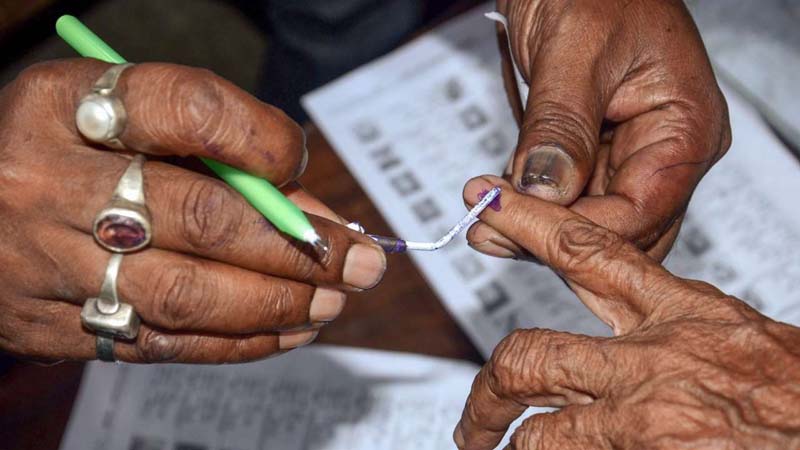Major exercise initiated after Delimitation report
DEOs told to submit proposals for appointment of EROs, AEROs
Sanjeev Pargal
JAMMU, May 30: In a step forward towards conduct of Assembly elections in Jammu and Kashmir, the Chief Electoral Officer (CEO) has ordered rationalization of all Polling Stations, wherever necessary before June 20 and freezing of all Electoral Roll Operations for the Union Territory on June 2.
The CEO has conveyed these directions to all 20 Deputy Commissioners of Jammu and Kashmir, who also happened to be the District Electoral Officers (DEOs).
“The CEO office will freeze all Electoral Roll Operations for Jammu and Kashmir on June 2,” official sources told the Excelsior.
They said all 20 districts in Jammu and Kashmir will work out proposals for rationalization of Polling Stations, wherever necessary, in terms of the extant directions of the Election Commission of India and submit them to the CEO office by June 20.
“After rationalization of Polling Stations and notification of new Polling Stations, Electoral Registration Officers (EROs) of new Assembly constitutions (as per Delimitation order) under the close supervision of DEOs shall undertake activities for printing Integrated Electoral Rolls,” sources said.
The CEO office has also asked all DEOs to submit proposals for appointment of EROs and Assistant Electoral Registration Officers (AEROs).
It asked for generation and printing of Integrated e-Roll for delimitation process under the supervision of DEOs by June 25.
“Disposal of pending claims and objections on ERONet and completion of all pending tasks including disposal of DSEs, logical errors, repeat EPICs, update photos of non-photo entries will be done on priority by June 1,” sources said.
The CEO office has directed that backup of State VM as well as live date on ERONet, up dation of e-roll data from Live Service to State VM Services and integration of all supplements in the e-roll shall be done by the IT team by or before June 10.
Sources said the CEO will share Existing Control Table Master Data of the Integrated e-Roll with all districts by June 17.
The CEO office has asked the DEOs to appoint BLOs, wherever required after notification of Polling Stations, integrate e-roll data where Polling Stations are to be shifting within Assembly constituency/district or outside, segregate and mark Sections/Polling Stations on e-roll within Assembly constituency/district or outside as per the Delimitation order, shift voters and Polling Stations from one constituency/ district to another, create/rename/ relocate new Polling Stations, re-serialize existing and newly created Polling Stations as per Assembly Constituency list, update Header Page of all Polling Stations (Revenue Units/Urban Local Bodies/ Panchayat Units) and mapping of new Parliamentary Constituencies, Assembly Constituencies and Polling Station numbers and names as per the Delimitation.
Thereafter, it said, Special Summary Revision of e-Rolls will be undertaken as per schedule to be notified by the Election Commission of India and accordingly the publication of draft rolls, filling of claims and objections, disposal of claims and objections and final publication of Electoral Rolls will be undertaken.
The Delimitation Commission had submitted its report on May 5 while the Law Ministry published it in the official gazette days later. The report now will be tabled in the Parliament after which the Central Government will decide the issue for nomination of Kashmiri migrants and PoJK displaced persons.
The Commission has already reserved nine seats for Scheduled Tribes and seven for Scheduled Castes in the Assembly. Kashmir will have 47 Assembly seats and Jammu 43.
While splitting Jammu and Kashmir into two Union Territories through the Reorganization Act, the Union Home Ministry had increased Assembly seats of Jammu and Kashmir by seven taking total seats to 114—24 of which are reserved for PoJK while election will be held for 90 seats.
Erstwhile State of Jammu and Kashmir had 111 seats including 24 reserved for PoJK while elections were held for 87 seats. With creation of Ladakh as Union Territory, four seats of the region were reduced and the Assembly was left with 83 seats. However, with increase of seven seats, J&K UT will have an Assembly of 90 seats. Two women MLAs will be nominated to the House, which was the position earlier also.
In the previous Assembly, Kashmir had 46 seats, Jammu 37 and Ladakh four.


